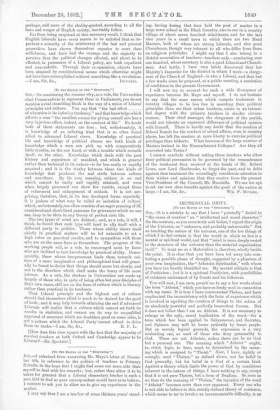rTo THE EDITOR OW THE SPEOTATOR."1 81R,—In considering the reasons
why, as a rule, the Universities olect Conservatives to represent them in Parliament, you do not mention a real stumbling-block in the way of a union of Liberal
principles and culture. You say that "the bad effect of education is its inflating tendency," and that knowledge which affords a man "the smallest excuse for giving oneself airs has a 'very injurious effect, indeed, on the conduct of life." No doubt both of these statements are true ; but, unfortunately, it is knowledge of an inflating kind that is so often found allied to advanced Liberal views. Knowledge of practical aife and knowledge of political abuses are both kinds of knowledge which a man can pick up with comparatively little trouble, on the one hand, or with a trouble which rewards itself, on the other. Knowledge which deals with the past 'history and experience of mankind, and which is general rather than technical in its nature—is far less easily or rapidly acquired ; and it is the rivalry between these two kinds of knowledge that produces the real strife between culture and unculture. By its very meaning, culture is an end which cannot be easily and rapidly attained, and even when largely possessed can show few results, except those of refinement and enlargement of outlook. It is not sur- prising, therefore, that, in its less developed forms especially it is jealous of what may be called an imitation of culture' which, unfortunately, too often consists of an eager pressing of ill: -considered and short-lived panaceas for grievances which no one owl deny to be blots in any theory of perfect civic life.
The two types of mind are distinct; and, as a rule, it will, I think, be found that each type will tend to ally itself with a different party in politics. Those whose ability shows itself chiefly in practical matters will be led naturally to set a high value on practical results, and to sympathise with those who are on the same lines as themselves. The progress of the working people will, as a rule, be encouraged most by those who are inclined to test knowledge by practical ability. Conse- quently, those whose temperament leads them towards cul- ture of a more imaginative and philosophical kind will gener- ally be found to desire that things should move but slowly, and not in the direction which shall make the hurry of life more intense. As a rule, the electors in Universities are made up largely of those who, in spite of being often but poor disciples of their own cause, still are on the lines of culture which is literary sather than practical in its tendency.
That Liberal principle and the highest sort of culture should find themselves allied is much to be desired for the good 'of both ; and it may help towards attaining the end if advanced Liberals will realise that a culture which cannot set forth its :results in statistics, and cannot see its way to unqualified approval of measures which are doubtless good on some sides, is yet a culture which the Liberal Party 'cannot afford to drive [How does this view square with the fact that the majority of resident teachers at both Oxford and Cambridge appear to be Liberal ?—En. Spectator.].

































 Previous page
Previous page